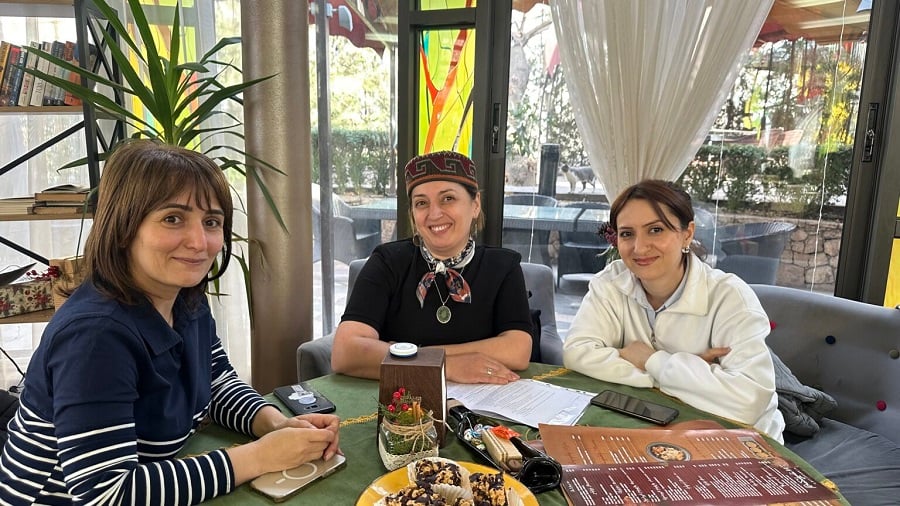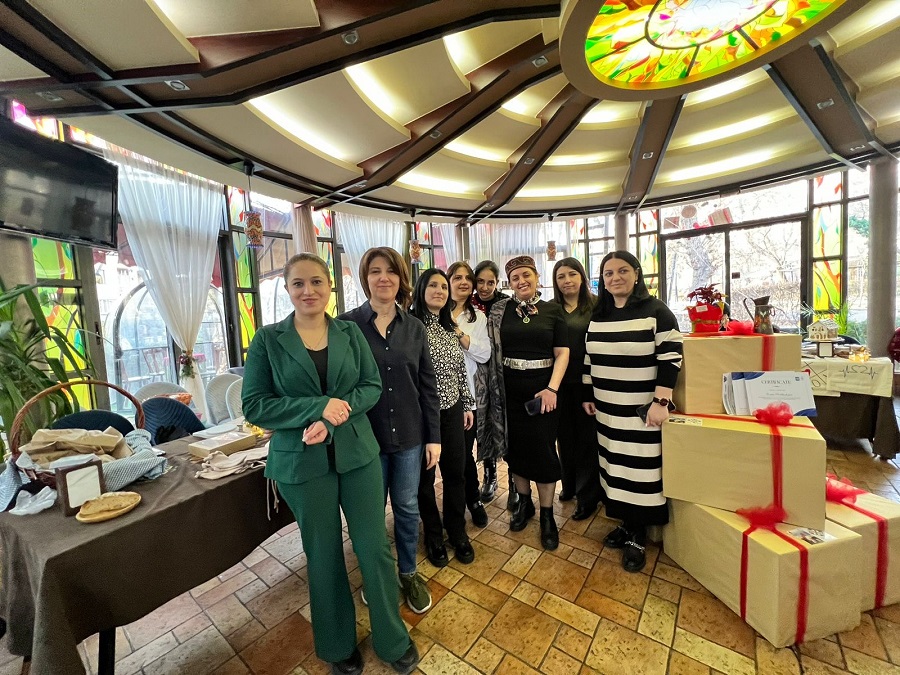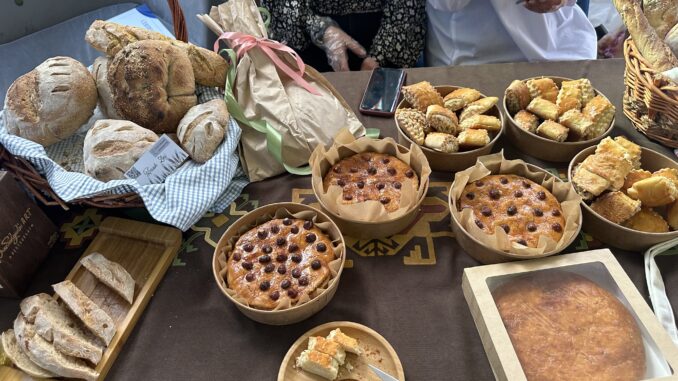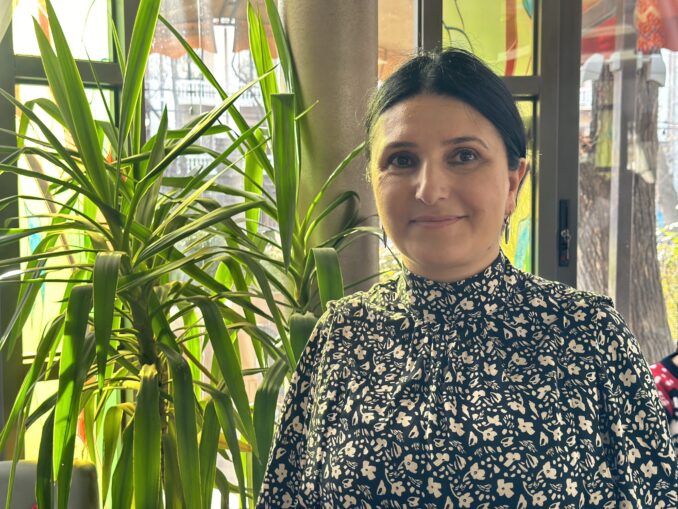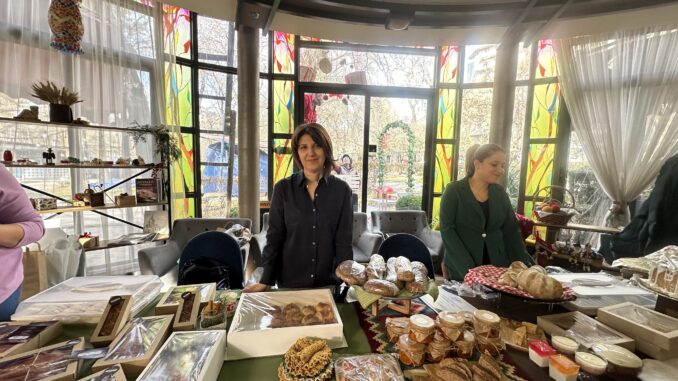The Armenian Weekly. On December 15, 2024, in the heart of Yerevan, Tumanyan’s ART restaurant hosted a bread exhibition and sale, filling the air with the aroma of freshly baked bread. However, this is not just any bread; it is a symbol of hope for Armenian women who have been forcibly displaced from their homes in Artsakh.
Following the nearly 10 months of starvation, siege and forced displacement in 2023, Kristin Balayan, the head of Milagri Foundation, has been working with this community in Yerevan. For the last four months, the women have been learning how to bake and sell a variety of healthy breads using different flours, including gluten-free options, and infusing them with unique flavors.
Choosing to bake bread was not an accident. “For us, the idea of bread was especially important during the blockade when there was a shortage of [it]. When every kind of food finished but there was still bread, people did not break. But when the bread ran out, people broke,” Balayan told the Weekly.
This program is implemented in partnership with the Embassy of the Netherlands in Armenia and focuses on human rights and gender equality, particularly aimed at engaging mothers of children with developmental challenges, who are considered doubly vulnerable, as noted by Larisa Harutyunyan, the political and economic affairs officer at the embassy.
Read also
Harutyunyan added that they initially chose to bake sourdough bread to ensure the high quality of the food. The use of sourdough reflects a commitment to health and nutrition, allowing participants to create wholesome products that not only nourish but also connect them to their cultural roots.
The delicious and healthy baked goods are made using live sourdough. Sourdough, a starter for dough preparation, is a homogeneous mixture of flour, water and yeast that has been pre-fermented. This type of bread-making is a longer process involving several stages.
“My grandmother always used to say, ‘Eat first, so that you have enough strength to take care of your children.’ That’s how I understood that we need to empower mothers first, so they can care for their children,” explained Balayan. Along with bread, participants have learned to bake traditional gata and other pastries to preserve the flavors and aromas of Artsakh cuisine.
“I remember what I had to use to get flour and bake bread during the blockade. It was hard to call it bread. I understood that [it] is the most important thing; in every situation, a mother must find bread for her child,” said Balayan.
The Milagri Foundation conducted programs for children with disabilities and developmental issues in Artsakh, but as Balayan explains, “We realized that we need to help mothers first, so that they can create small businesses without being separated from their children and homes, to meet their children’s special needs and earn money.”
The participants of the program not only bake bread but also manage their business’ social media pages to learn about marketing and photography. They work with a psychologist, as well.
“The dough and flour are like pottery; they have an art therapy effect. The fine motor skills involved in baking release tension and possess magical qualities through their taste and aroma,” said psychologist Rouzanna Mkrtchyan. She emphasized the significance of this activity for women who have children with developmental challenges, including intellectual and mobility issues.
“These women face various difficulties and are experiencing post-traumatic stress. They navigate through unresolved grief, anxiety and uncertainty,” she said. “Bread is not only a business; it also serves as a means of integration, which is crucial for those who are specialists in different fields and are starting anew at an older age,” she explained.
Mkrtchyan highlighted that as these mothers engage in baking, they regain faith in their abilities. They have lost not only their homeland and loved ones but also face new challenges in raising their children. Many experience emotional fluctuations and isolation, making work a vital aspect of their recovery. “In this context, having a job is essential,” she said.
One of these women, Anush Sargsyan from Stepanakert, is a psychologist who previously worked in a school. After her forced displacement, she decided to pursue a different line of work. For Sargsyan, baking bread has become a healing process. Her father owned a bakery in Stepanakert starting in the 1990s, which operated even during wars and blockades. Following Sargsyan’s displacement, Azerbaijani forces destroyed not only her family home but also the bakery and the entire neighborhood.
“Now, baking bread is also my form of resistance. I oppose my circumstances through this,” Sargsyan said, with hope that her small baking venture might one day lead to reopening her family’s large bakery.
Another participant, Diana Ghalayan, connects her return to baking with the absence of bread during the blockade. In Artsakh, she worked at the National Assembly, and now lives in Echmiadzin with her family. “Bread holds great significance for us,” she said. “Perhaps many do not feel its importance during times of abundance, but during the blockade, we understood what bread truly means — standing in line all night for just one loaf and returning home empty-handed without knowing how to feed our children.”
“You can endure any shortage but not that of bread,” Ghalayan continued.
For Svetlana Danielyan, an accountant, bread represents life itself. After the loss of Artsakh, she finds herself drawn to baking as a means of coping and creating anew. She bakes bread using various ingredients such as sunflower seeds, pumpkin seeds and whole grain flour. “Bread is life for me. You create something from just flour and water — you create life; you gain energy,” she expressed passionately.
After their forced displacement, each woman copes in her own way, demonstrating bravery and resilience. These unbreakable women face their challenges head-on in a new reality. What they need most is a little support and encouragement to give them the wings to soar once again.
Siranush Sargsyan
Main Photo Caption: Kristin Balayan with her colleagues at Tumanyan’s ART (Photo: Siranush Sargsyan)




















































